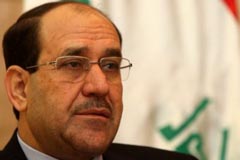Iraq on Wednesday extended a year-end deadline to close an Iranian dissident camp by six months, responding to a request by the U.N., which is mediating the resettlement of its more than 3,000 residents, to delay the closure.
The 25-year-old Camp Ashraf, home to the People’s Mujahideen Organisation of Iran, or PMOI, an Iranian opposition group that the United States and Iran officially consider a terrorist group, is some 65 km (40 miles) from Baghdad.
Iraq’s Premier Nuri al-Maliki said he had agreed to extend the deadline on condition the U.N. transfer about 400-800 residents to other countries before the end of this year.
"He (U.N. Secretary-General Ban Ki-moon) asked us to give them a chance and we gave them a chance. The case is now in the hands of the U.N. We hope they will close this file, we don’t want to hand them to Iran," Maliki said at a press conference.
"We don’t want to kill them, we don’t want to abuse them and we don’t want to make them starve. But their presence is illegal, so under any title, this has to end."
Camp Ashraf’s future became uncertain after Washington turned it over to the Iraqi government in 2009. Baghdad has repeatedly said it does not want the guerrilla group on Iraqi soil.
The United Nations, along with the European Union, has been trying to resolve the issue, one of the main outstanding problems left after the last U.S. troops withdrew from Iraq on Sunday, almost nine years after the 2003 invasion.
Rights group Amnesty International says the residents are subject to harassment by the Iraqi government and are denied access to basic medicine. More than 30 residents were killed in a clash with Iraqi security forces in April.
A leader of the PMOI said on Tuesday it would agree to a U.N. plan to move residents of the camp to a new location on condition that the U.N., U.S. and EU support and endorse the proposal and that the Iraqi government guarantee the residents’ security and well-being.
In the 1970s the group, which is also known as the Mujahadin-e Khalq (MEK), led a guerrilla campaign against the U.S.-backed Shah of Iran, including attacks on U.S. targets.
(Writing by Serena Chaudhry; Editing by Matthew Jones)
By Suadad al-Salhy

